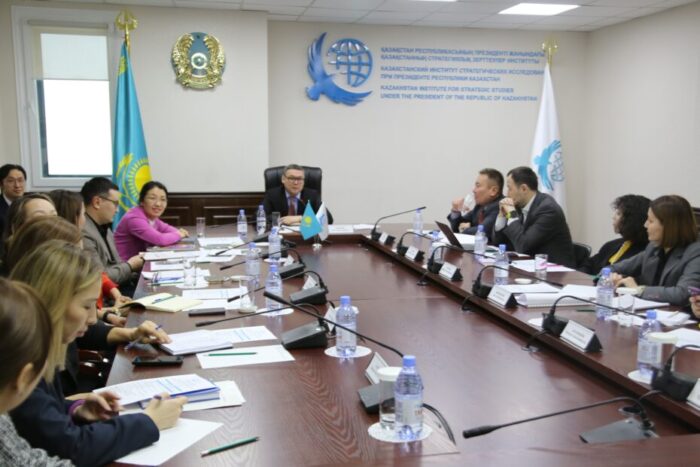ASTANA – Kazakhstan’s analytical centers presented their research results on the current value orientations of the country’s residents at the Kazakhstan Institute for Strategic Studies (KazISS) expert platform on Jan.26, reported the institute’s press service.

Photo credit: kisi.kz
According to KazISS Director Yerkin Tukumov, Kazakhstan has witnessed consistent gross domestic product growth over the past decades, leading to shifts in core values. The state’s economic progress directly affects the population’s living standards, resulting in inevitable cultural and fundamental changes in Kazakh society.
Tukumov outlined three distinct population groups, stating, “The first group embodies carriers of traditional, materialistic values. The second group comprises those with post-materialistic values. The third and most extensive group consists of individuals with mixed values”.
Yelena Burova, the chief research fellow at the Institute of Philosophy, Political Science, and Religious Studies of the Ministry of Science and Higher Education, focused on the sociological aspects of the relationship between religious and secular values in contemporary society in Kazakhstan.
“Sociological research shows that the process of religious revival in the country’s society has experienced a stage of religious renaissance. Currently, religious traditions and practices are starting to contend with secular institutions, traditions, and practices. Nineteen percent of the Kazakh population shape their lives with a strong connection to religious values,” she said.
Aigul Zabirova, the KazISS’s chief research fellow, identified six main trends in values based on the institute’s research.
Zabirova noted that family values dominated among the surveyed respondents at 98%, followed by the importance of friends at 91%. Respondents described friendship as a significant resource. In the third position, nearly 89% emphasized the value of free time, which was perceived as a modern priority. Work ranked fourth, with over 88% highlighting its significance. Religion was recognized as a value by over 76% of respondents, while politics garnered acknowledgment from over 61%.
Gulmira Kurganbayeva, the head of the National Mentor Online Academy, discussed the role of modern schools in shaping values, noting that the Z and Alpha Generations especially emphasize their individuality.
“They reject group perception, demand recognition of individuality, and seek to hear each person’s opinion. Their second value is freedom, demonstrated in their choices of academic profiles, schedules, and teachers. Another significant value for many is leadership, with schools now promoting leadership as both individualism and team spirit. For these generations, creativity is a mandatory value, emphasizing the need to innovate and create meaningful new realities,” said Kurganbayeva.
Speakers also highlighted various factors influencing the formation of values and changes in Kazakh society’s value system. These include urbanization, socio-economic conditions, demographic and generational shifts, digitization, and the noteworthy role of the creative industry in elevating the Kazakh language’s status as a national value.
